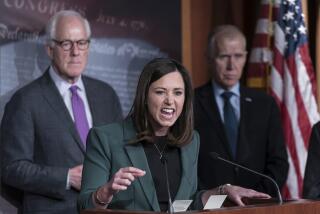Administration Plans New Push for Contra Aid
WASHINGTON — The Reagan Administration is planning a new drive in Congress for aid to the pro-American rebels fighting Nicaragua’s leftist regime, and congressional Democrats said Thursday that the chances for renewed funding may have improved.
President Reagan is committed to asking the new Congress to resume U.S. funding for the rebels, Administration officials said. But they said they are still debating how hard he should push and what form the aid should take.
Funds Halted in Spring
Congressional Democrats cut off the CIA’s officially secret appropriation for the rebels, known as contras, last spring after spending more than $73 million on the covert war since 1981. In October, Congress again refused to provide money but set aside $14 million that will be available in March if both the Senate and House vote to release the funding.
Renewed funding “will take a major commitment of political capital on the President’s part,” said a key Democratic congressman who asked not to be identified. “But if he goes all out for it, his chances look about 50-50.”
“The climate has changed from six months ago,” another congressional source said. “Nobody is arguing that the Sandinistas are a noble cause anymore, and the contras have gained some stature by going it alone since the funding was cut off.”
They acknowledged that their forecasts, made on the first day of the new Congressional session, were not based on careful head counts. But they said that a number of factors have improved the contras’ standing, including reports of increased repression by the Marxist-led Sandinista government and a declaration by moderate opposition leader Arturo Cruz that he supports renewed aid.
Cruz, who last year urged the United States to be more conciliatory toward the Sandinistas, said Thursday he has concluded that only increased military pressure can persuade the Managua regime to compromise with its opponents.
“The aid (to the contras) is a bargaining chip,” he said. “If you throw it away, you are removing the possibility of a negotiated solution.”
Cruz appeared at a news conference with Pedro Joaquin Chamorro, former editor of the Nicaraguan opposition newspaper La Prensa, who charged that the Sandinistas had imposed “the most terrible censorship in the history of Latin American dictatorships.” Chamorro also endorsed Cruz’s call for new funding for the contras.
Obstacles to the Administration’s hopes of winning new funding include the widespread criticism in Congress of the CIA’s conduct of the program, culminating in furors last year over the mining of Nicaragua’s harbors and a guerrilla manual that seemingly advocated assassination of Sandinista officials. The new chairman of the House Intelligence Committee, Rep. Lee H. Hamilton (D-Ind.), is a highly respected figure who has vowed to fight any move to resurrect covert funding.
The Administration says the United States should help the contras--whom Reagan calls “freedom fighters”--in pressuring the Sandinistas into adopting a more democratic domestic system and stopping their support for guerrilla movements in other Central American countries. Democrats charge that the Administration is actually trying to topple the Sandinista regime, that the contras have proven incapable of achieving any reasonable goals and that the net effect has been to promote an unnecessary war.
Lobbyists for and against the contras already have launched new campaigns on the issue. Each side has released long, detailed lists of murders and other atrocities allegedly committed by its opponents in the Nicaraguan war.
The Administration, however, has not yet decided on a strategy for winning new funding, officials said.
“The President, on every occasion when he’s been asked, has indicated that we should support the resistance forces,” a White House aide said. “There’s no doubt in my mind as to his commitment, . . . and I’m sure he’ll make whatever effort is required to get it. But it’s too early to talk about strategy.”
Some State Department officials reportedly have argued that the Administration should not press for a vote on the issue unless it is certain it can win, because a clear defeat would weaken the U.S. position in ongoing negotiations with the Sandinistas. But the White House aide said that Reagan intended to force congressmen “to go on the record, for or against.”
Also uncertain is the precise form the new aid request will take, officials said. The probable new chairman of the Senate Intelligence Committee, Sen. David F. Durenberger (R-Minn.), has said he opposes renewed covert funding of the contras through the CIA--but would support some form of “overt” arrangement that would channel aid openly, perhaps through the Defense Department.
Pentagon officials have said they are intrigued by that idea. But a senior State Department official called it “impossible, politically and legally.”
“Funding the contras overtly,” he charged, “would be tantamount to introducing a U.S. combat force.”
Some Democrats have suggested that they might be comfortable with some form of “non-lethal aid”--meaning food and medicine for the contras, but no military equipment. And contra officials have said they would welcome such an arrangement if it would help get them the money they want.
The ultimate aim of the policy, on which Administration officials have frequently disagreed, is also a factor congressmen will consider.
“There’s no question in my mind that Cruz is right, that funding the contras is an important piece of leverage to use in negotiations with the Sandinistas,” an aide to an influential Democratic congressman said. “But we still aren’t convinced that the Administration is serious about negotiating. Until they can make that case, I don’t believe they can turn enough Democratic votes around.”
More to Read
Sign up for Essential California
The most important California stories and recommendations in your inbox every morning.
You may occasionally receive promotional content from the Los Angeles Times.











